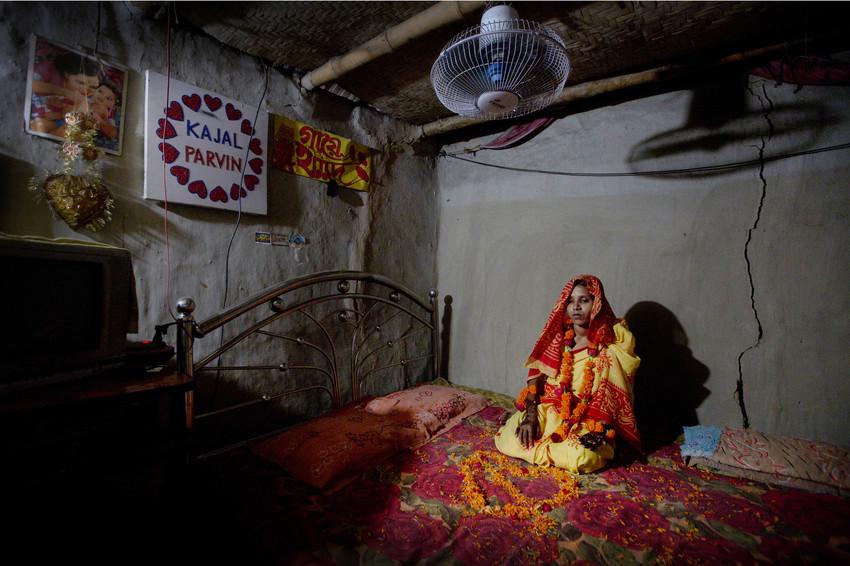
One in four girls in Bangladesh is married by the age of 14 – a report by Plan International and Asia Child Marriage Initiative (ACMI) has found.
The report looked at the root causes of child marriage in three countries – Pakistan, Bangladesh and Indonesia. The research revealed that females marry significantly younger than males in all three countries and that this pattern is rooted in rigid gender norms. One boy from Bangladesh explained, “I must choose a bride who is younger than me so that I can control her. Moreover, she will be able to satisfy my demands… if I marry an older woman; she will try to have authority over me, and might not satisfy me sexually.”
The research findings also confirmed that child marriage often occurs as a response to income poverty, particularly in contexts where there is the institution of dowry. The majority of respondents agreed that even if a person “does not want to marry they should honour the decisions and wishes of their family”. As one 14-year-old boy in Bangladesh explained: “marriage is a social norm practiced over the years. Without marriage, a person is treated as incomplete.”
An unmarried girl is regarded as posing a constant threat to the reputation of her family – because she is might engage in a relationship prior to marriage or be the victim of sexual harassment.
Lack of education and other opportunity is a significant driver of child marriage. There is a prevailing attitude that education of girls is neither desirable nor necessary.
Along with tackling gender norms, addressing poverty and education inequality, access to sexual and reproductive health services can help to reduce child marriage. Read the full report and its recommendations for eradicating child marriage.
Here we take a look at the story of Sharina, a child bride from Bangladesh.
Forced to marry at 14

Sharina from Bangladesh did not meet her husband before the wedding. The first time she caught a glimpse of him was after the ceremony when she threw a last glance at her childhood home as she was carried out of the house and forced into a waiting car.
At age 14, Sharina knew little about what it meant to be married. Reality suddenly hit her when she finally looked at the man beside her. He was not handsome, she did not like the look of him. The two teenagers did not exchange a word as the car set off. After a while Sharina was car sick and her tears started flowing. Then she fainted.
Nazir (Sharina’s husband), 17, had also been forced to marry when his mother could no longer manage to take care of him. He was shown a picture of Sharina and given him an ultimatum. It was her or nothing at all.
“I did not want to get married because I was young and I was scared”, says Sharina. She sits in her new home in a village outside Dhaka in Bangladesh.
Sharina’s father's last wish in life was for her to get married. He had tuberculosis and did not have long to live. He wanted to secure his daughter's future, he said.
The day before the wedding, the bride's family gathered for the ceremony. A traditional wedding in Bangladesh often lasts for several days. Sharina sat on a straw mat wearing a yellow sari as she was decked with flowers in her hair and around her neck. It was a beautiful picture; the bride had henna painted on her hands and arms and her brothers had hired dancers. But Sharina spent the whole time crying.
Sharina did not meet her visitors' eyes once during the ceremony. She was asked to say a ‘kobul’, a confirmation that she consented to marriage, but she would not say the words. Her uncle was furious and shouts filled the air from several guests demanding she say it. Finally, she had no choice but to consent without lifting her eyes. Still, she had not seen her husband's face.
The third night after her marriage, her husband Nazir came to her. It was the day after they had talked for the first time. He said he only wished that she treated his mother with respect. Then he wondered if she liked him - and if she had been intimate with anyone before. She had not. She said she wanted to go home. He said that she was married now, she had no choice. He was kind and understanding, but said she had to realize that this was her life now.
A few months after the wedding, Sharina was seriously ill. Nazir sat with her every night, putting wet clothes on her forehead and taking care of her. He was afraid and said he would rather die than lose her. He said he loved her. After this, her feelings for Nazir gradually changed. She missed her family and friends, but now she had Nazir to care for her.
When she fell pregnant it was Nazir who looked after her. Much of pregnancy she struggled with vomiting and nausea. When she got an extreme pain in the abdomen, the couple went to the hospital. The baby had been getting too little food and they were both weak. Nazir made sure she drank enough liquids. Four days later, Tonni born.
For herself, Sharina has no future plans, this is her life now but she will give her daughter the best she can. The couple's wish is that their daughter will go to school and study - something they never had themselves. Nazir wants his daughter to be a doctor. They know that they will never repeat the mistake committed by their parents - to marry off their daughter before she is ready.
No girl should be forced to marry. Every girl should have the opportunity to complete her education and make choices about her future.
Source: plan-uk.org
 FR
FR EN
EN AR
AR








